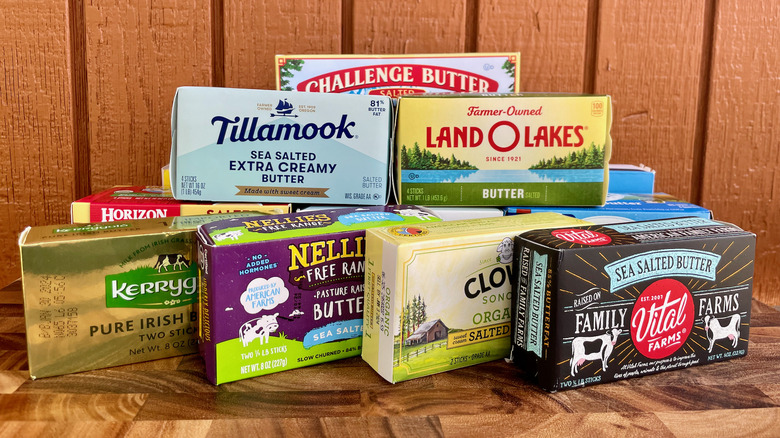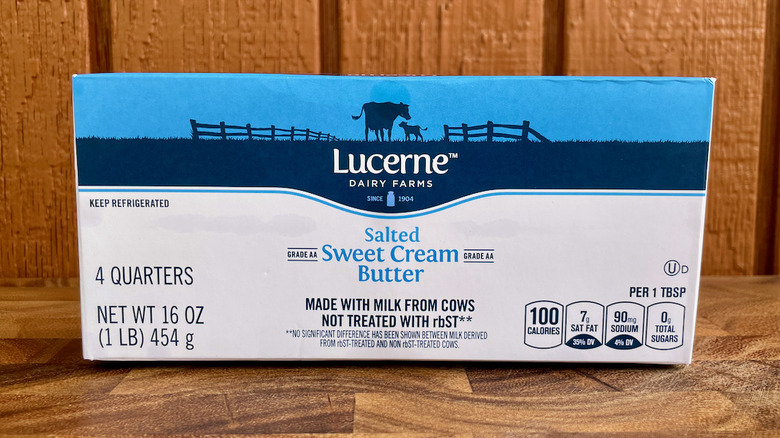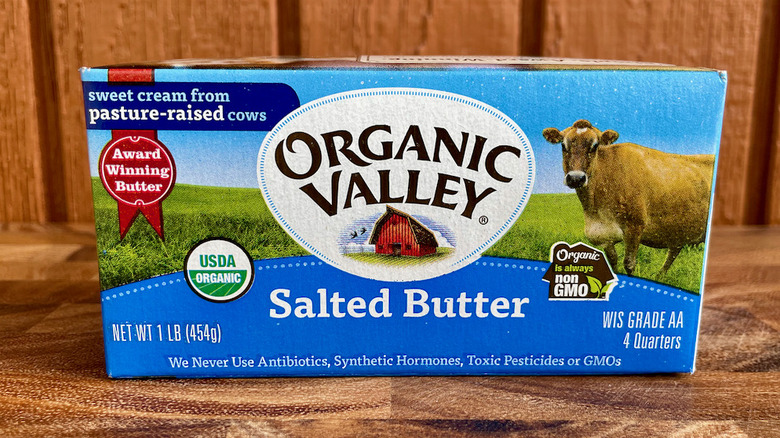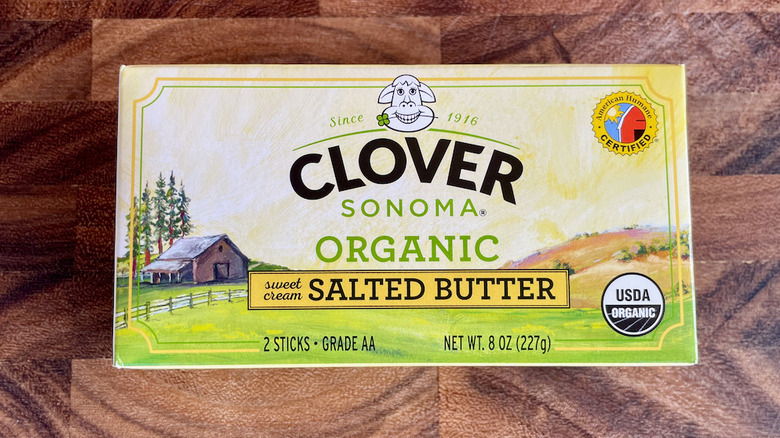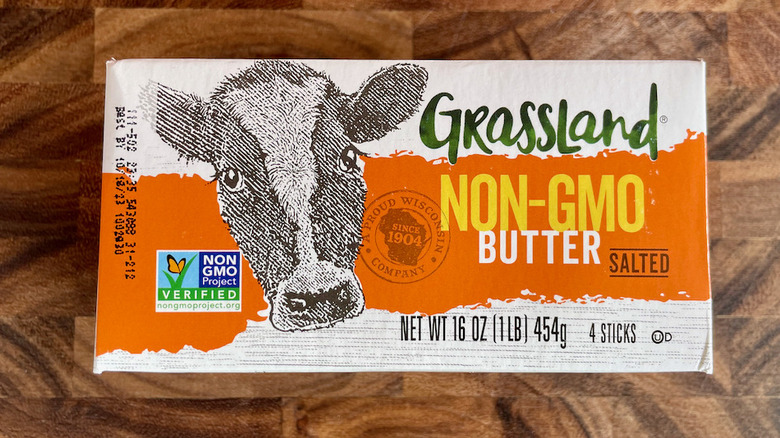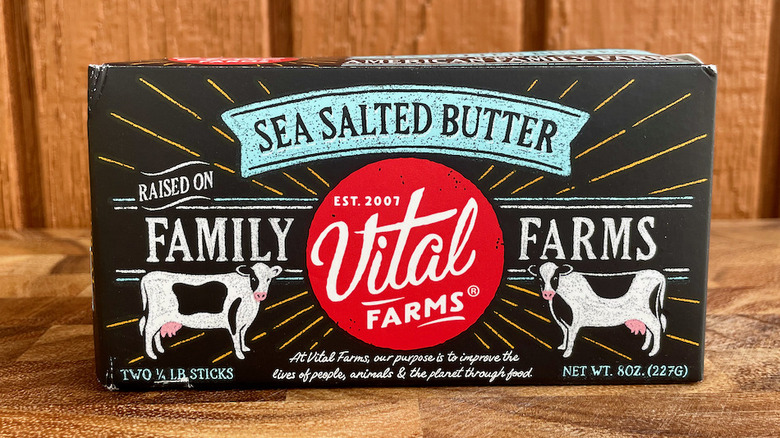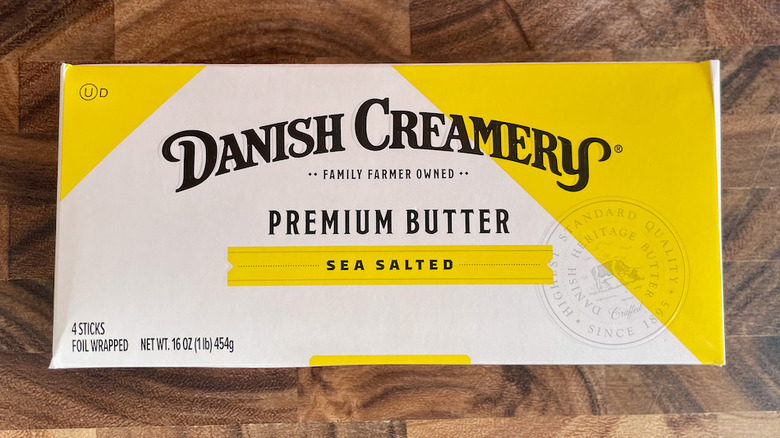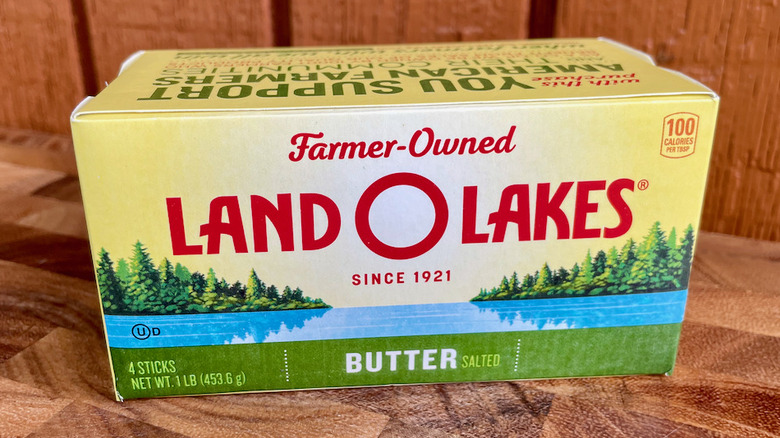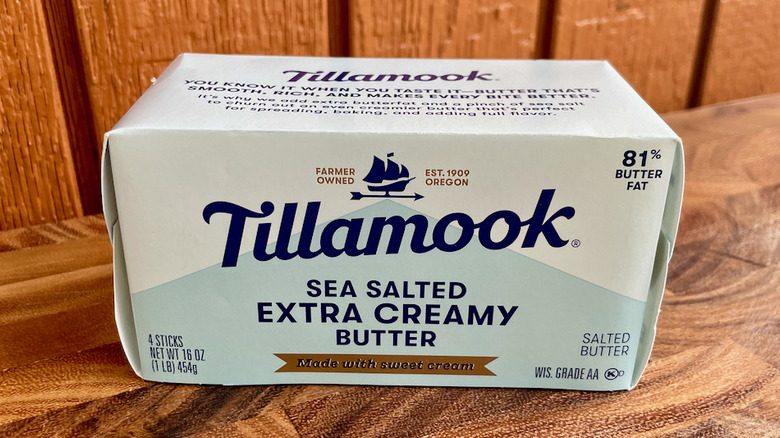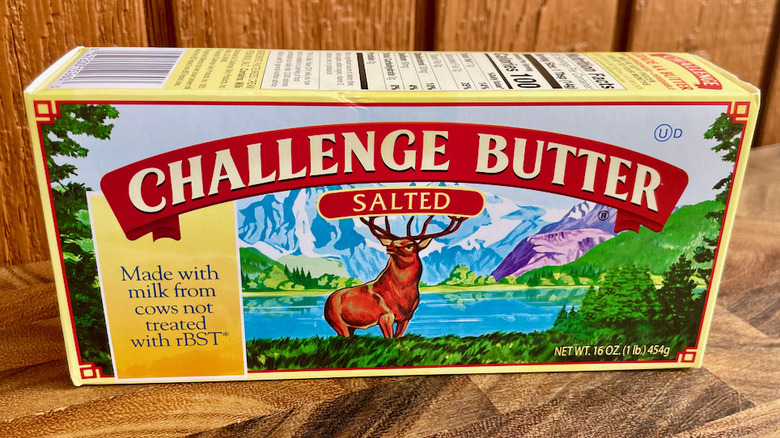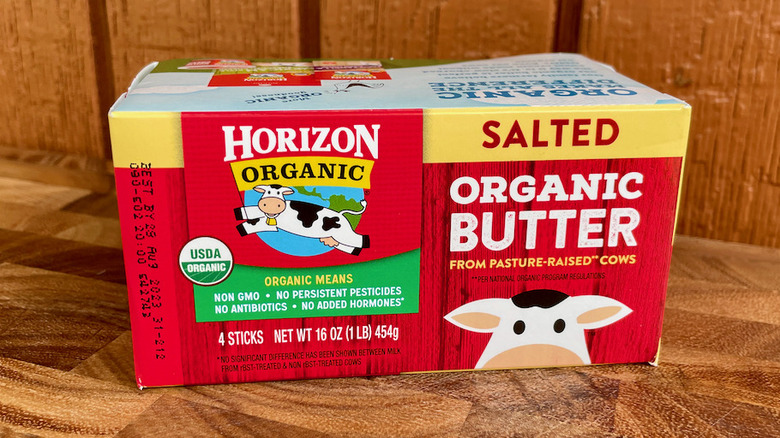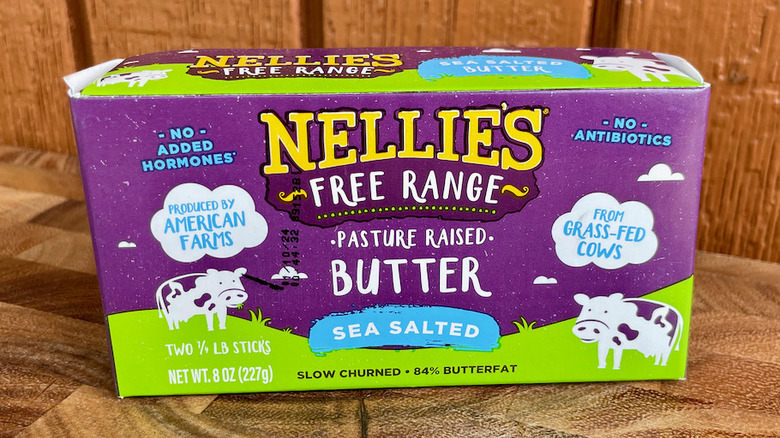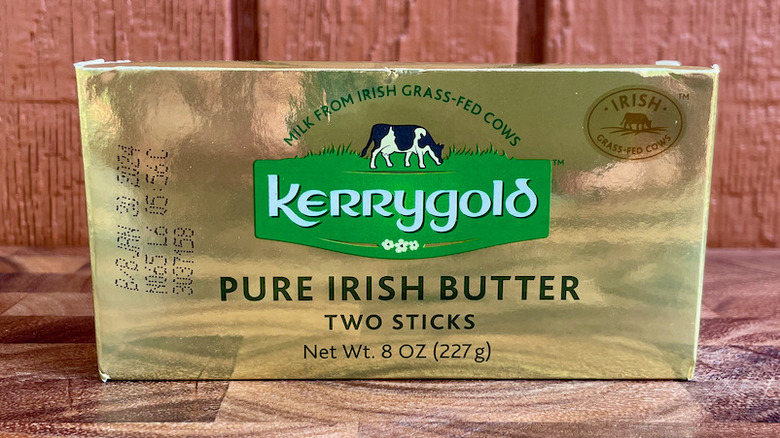12 Popular Grocery Store Butter Brands, Ranked
Can you imagine a flaky croissant without the rich taste of butter? Mashed potatoes would be pretty sad and bland without a heaping helping of everyone's favorite dairy-based fat. That's not to mention the utility it has beyond just its flavor. Finishing sauces with butter helps to give them a velvety texture due to butter's emulsifying properties — the water in butter turning into steam is what gives puff pastry its lift.
It's safe to say that (almost) everything is better with butter, but that doesn't mean every brand of butter is equally great. Any grocery store will stock a variety of sticks, blocks, and tubs at prices that range from affordable to luxurious, and it can be hard to tell which ones are the best to buy. That's where Tasting Table comes in. We picked up a wide selection of butter brands from our local supermarkets and taste-tested them all so we could present our findings to you, ranked from worst to best. For this test, we bought exclusively salted butter and let each option come to room temperature to make a fair comparison between brands. We spread them so thickly on pieces of bread that all we could taste was butter. A couple were disappointing, most were pretty good, and a few were life-changing.
12. Lucerne
First off, we should note that even though this brand came in last in our taste test, it would still suffice for most of your normal butter needs. If you weren't tasting it on its own as we did, you probably wouldn't notice the weird aspects of its flavor that stood out to us. And Lucerne did have some good qualities. When softened, it held its emulsion between fat and water, preserving its creamy mouthfeel. Some of the butters started separating at room temperature, which gave them a greasier texture. It was also less bland than many of the competing brands, with plenty of fresh sweet cream flavor.
While its initial taste was pleasant, the aftertaste was where Lucerne went wrong. At first, we thought our bread had an off flavor, but then we tasted some of the butter straight from a knife and confirmed at Lucerne had an aftertaste that was a dead ringer for SweeTARTS candy. It had some acidity, but it wasn't the cheesy tang you get in fermented or cultured butter; it was the citric acid-like tingle familiar to any fan of sour candy. The aftertaste had chalky notes to it as well, enhancing the SweeTARTS vibe. We're sure this butter would be fine if you used it in a recipe with other ingredients, but we didn't particularly enjoy it as a spread on bread.
11. Organic Valley
Different brands of butter seem to soften at different rates. After two hours on the counter, some brands almost melted, but Organic Valley remained firm yet perfectly spreadable. Its texture was its greatest asset — creamy and smooth. Other than that, it was fairly unremarkable and didn't have a lot of flavor. It reminded us most of Land O' Lakes, except that it had fewer of the milky, sugary notes that made that brand of butter distinctive. Instead, Organic Valley tasted mostly of neutral fat. There was a teeny bit of umami flavor in the aftertaste, and the butter was seasoned with plenty of salt, but this wasn't enough to overcome the overall weakness of its flavor.
Organic Valley butter didn't have any off-notes, which gave it a fairly significant edge over Lucerne. However, at nearly $7.00 a pound from Sprouts, it cost significantly more than standard grocery store butter. Of course, if you are passionate about animal welfare, you may find the fact that this butter is made using milk from pasture-raised cows to be worth paying extra for. Even if that's true, though, other pasture-raised butters on this list brought a lot more in the taste department.
10. Clover Sonoma
This butter looked fantastic. It had a deep golden color that just made us excited to eat it. The yellow hue is likely a side-effect of the fact that Clover sources milk from cows that have access to pasture — grass-fed butter tends to be darker than grain-fed. The only other butter brand we tried that looked this good was Kerrygold, which you'll find higher on this list. Our eyes primed us for this butter to deliver a world of flavor, but it ended up being mildly disappointing.
Like Organic Valley, Clover tasted mostly like fat, with very little milk flavor or savoriness. To our palates, it seemed undersalted compared to many of the other butter brands. The fat flavor in Clover reminded us of canola oil — it had a mild bitterness and a slight vegetal quality that none of the other butters possessed. We weren't crazy about the hint of bitterness, but it wasn't off-putting. The hint of vegetable flavor gave Clover a bit of personality and lifted it above Organic Valley in our rankings.
9. Grassland Non-GMO
This butter fills an interesting niche in the market. It's a premium butter, but it's not organic — just non-GMO certified (the cows are fed on crops that aren't genetically modified). It also has a Validus animal welfare certification. We paid $7 for it at our local Sprouts, which was comparable to some of the organic butters. If you're not into GMOs, there's a good chance you prefer to buy organic anyway.
In any case, this was another premium butter that didn't have as much flavor as we would have liked. We will give it points for its sweet cream taste — we could detect some of the milky notes we look for in high-quality butter. However, it also had some of the bland fattiness we encountered with Clover and Organic Valley. A truly great butter needs to have hints of fresh cream balanced with umami and tang, and this product only had one side of the equation. Also, according to the U.S. Food & Drug Administration, there's no real scientific evidence that genetically-modified foods are bad for you, so we don't see any compelling reason to spend extra on this butter brand.
8. Vital Farms
Vital Farms offers the kind of branding (and price tag) that would make you think that it is organic or that its dairy cows are pastured. However, not all of the company's cows have access to the outdoors and its products are not organic or non-GMO. The company is transparent about the animal welfare standards it does follow, though, so you can do your own research to determine if its practices align with your values.
We paid nearly $5 at Sprouts for a half-pound package, which felt quite steep for a brand that is neither organic nor pasture-raised. It did have a pleasant taste; this butter veered more towards the savory side of the spectrum, with some tanginess and a savory edge. The texture was quite nice as well. It stayed creamy and emulsified after two hours at room temperature and didn't start weeping grease. This product's butterfat content is impressive, too. At 85%, it's fattier than most American butter (minimum 80% butterfat) and even some European butter (minimum 82% butterfat). We're still ranking it in the bottom half despite these good qualities because it had less flavor than other butter brands at lower price points.
7. Danish Creamery
Danish Creamery brands its flagship product as premium butter, but there didn't seem to be anything exceptional about it besides the name. It's also not Danish — although the company was founded by Danish immigrants in the 1800s, it's actually located in California. To us, it looked and tasted like average grocery store butter. Nothing about it was bad, but after we ate it, we struggled to remember what Danish Creamery butter tasted like.
This was one of the saltiest-tasting butters on this list, which was our favorite thing about it. It had very little sweet dairy flavor, but the saltiness was perfect for spreading on toast. However, the salt couldn't mask the fact that the underlying product was pretty bland. We don't think we would enjoy an unsalted version of Danish Creamery butter — other than the salt providing savoriness, there just wasn't much going on taste-wise. It was like a more well-seasoned version of Organic Valley. Nevertheless, we like salt and we appreciate that this butter is on the affordable side, so it lands near the middle of the pack.
6. Land O' Lakes
We have arrived at America's most popular butter brand, with $19 billion in sales in 2022, according to the company. As the benchmark for American butter, it's appropriate that Land O' Lakes should land right in the middle of our rankings. It's not spectacular by any means, but it's a solid option that you can find in most grocery stores.
The most notable thing about Land O' Lakes was how sweet it was. It didn't taste like it had sugar added to it, but it was full of the natural sweetness you expect when you eat dairy products. If this is the flavor you want from your butter, Land O' Lakes might be your best option. The texture was excellent as well, with a dense creaminess and no greasy mouthfeel. Ultimately, however, we found this butter pleasant but a bit one-dimensional. Even though we tasted a decent amount of salt, the butter had no real savory qualities — it was sweet followed by a salty aftertaste, with no umami or tang. This brand is one of the best in terms of bang for your buck — a bit over $5 a pound at our area Walmart.
5. Tillamook
When we bought Tillamook butter, we scoffed at its "extra creamy" branding. All butter is creamy, so how could Tillamook go the extra mile, especially since this butter only contains a modest 81% butterfat? We're not sure what kind of magic they're playing with up in Oregon, but this really was the creamiest-tasting butter we tried. It rivaled Land O' Lakes for sweetness while also delivering a rich, fatty mouthfeel. This butter also remained firm and emulsified at room temperature, which we appreciated.
Tillamook was one of the most complex butters we tried flavor-wise, for good and ill. On the plus side, in addition to a ton of sweet cream, this product also delivered some mouth-watering umami in its aftertaste. We appreciated the savory flavor, especially since Tillamook didn't taste quite as salty as we would have liked; the savoriness of the butter helped make up for the relative lack of salt. As for the negative, we detected a faint hint of the bizarre SweeTARTS flavor that bothered us in the Lucerne. It wasn't enough to ruin Tillamook for us, but the sour candy tang did knock this butter down a few spots on our list.
4. Challenge
At under $5 a pound from our local Walmart, Challenge was the least expensive butter we tried for this ranking, and it did quite well given how little we paid for it. This was well salted, which was perfect for using as a spread on bread — for that purpose, we like our butter to be heavily seasoned. The seasoning also worked harmoniously with the flavor of the butter itself, which was light on sweet dairy notes and heavy on savoriness. The aftertaste had a tang that was reminiscent of cheese. Especially at this price point, we were quite impressed by its flavor — it had more taste than many of the premium and organic butters we sampled.
If we were evaluating purely on flavor, Challenge would rank a couple of spots higher, but its texture wasn't great, at least at room temperature. This butter separated more than any other brand as it softened, which gave it a slightly greasy and oily rather than creamy mouthfeel. That wasn't a huge problem for us, though, because we loved the savory, salty, tangy taste.
3. Horizon Organic
Horizon's butter golden-hued sticks are made with pasture-raised milk, and whatever those cows are eating in the fields seems to have made a notable impact on the taste of the butter. This is the butter to buy if you want no sugary notes at all — it was completely devoid of sweetness. Like Clover, it kind of tasted more like oil than butter, but instead of canola, Horizon reminded us of yummy extra-virgin olive oil (the flavor resemblance was uncanny). This butter had a mild bitterness, some soapy (in a good way) notes, and all the bright pepperiness you associate with high-quality olive oil.
Though enjoyable, that flavor would limit the applications you'd want to use Horizon Organic butter. It wouldn't be our first choice for most desserts — we'd reach for a sweeter, more neutral-tasting butter like Land O' Lakes in that context. But for savory food, particularly anything with a Mediterranean influence, this would be our go-to.
2. Nellie's
Nellie's grass-fed, pasture-raised butter was another one with a ton of personality. The ingredient list said it contained lactic acid, and we could really tell; it had a ton of sour, cheesy, and umami flavor. It almost tasted like cultured (or fermented) butter, though it made no claim to be so the label. Either way, the powerful tang of this butter made it incredibly savory. It was a delicious and mouthwatering spread for bread, and we could see it working very well in a variety of sweet and savory recipes as well. It also earns bonus points for its hefty 84% butterfat content.
Unlike the olive oil flavor of Horizon Organic, which seemed like it would be strange in desserts, we could imagine the acidity of Nellie's butter adding a nice contrast to the sugar in pastries. There was also a sweet cream presence, though it was less pronounced than the savory elements and showed up mostly in the aftertaste.
We quite enjoyed this butter, but we could imagine its funky flavor being a little off-putting for some consumers. If you turn to butter for gentle creaminess, Nellie's would be the wrong choice for you. But if you looking for a touch of funk, Nellie's delivers.
1. Kerrygold
Kerrygold may be a little more expensive than some of the other butter brands at the grocery store, but it's worth every penny. It earns its name with its deep, rich, gold color — it almost looked dyed. This was the only butter we could smell the second we opened the wrapper. An intoxicating odor of fat, salt, cream, and grass wafted toward our nostrils.
The butter is churned from milk produced by Irish grass-fed cattle, and we noticed a noticeable flavor difference between it and American butter, even the stuff from pasture-raised cows. Its flavor wasn't as eccentric as that of Nellie's or Horizon. Instead, it gave us all the standard butter notes — creamy dairy, sweetness, salt, and sharp savoriness — but just with the volume turned up. Thankfully, it had none of the bland fattiness of lesser butter brands.
Kerrygold's rich flavor and soft, unctuous texture were doubly surprising to us considering the fact that the U.S. version of this product is made following domestic butter standards. American Kerrygold salted butter is only 80% butterfat, but you wouldn't know that from tasting it. It was much more flavorful (and even seemed fattier) than Vital Farms butter, even though the latter contains 5% more fat. No matter whether you're looking to use butter in cooking, baking, or as a bread topping, we think you'll find that Kerrygold is a flavor upgrade over your usual brand.
